Create a professional CV now!
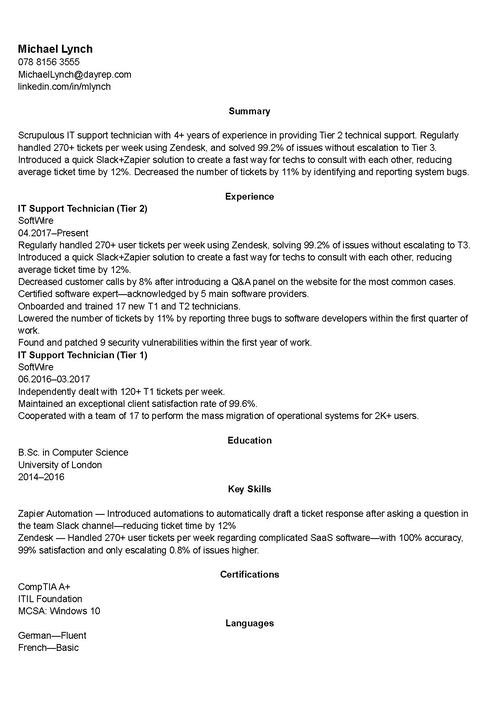 NO
NO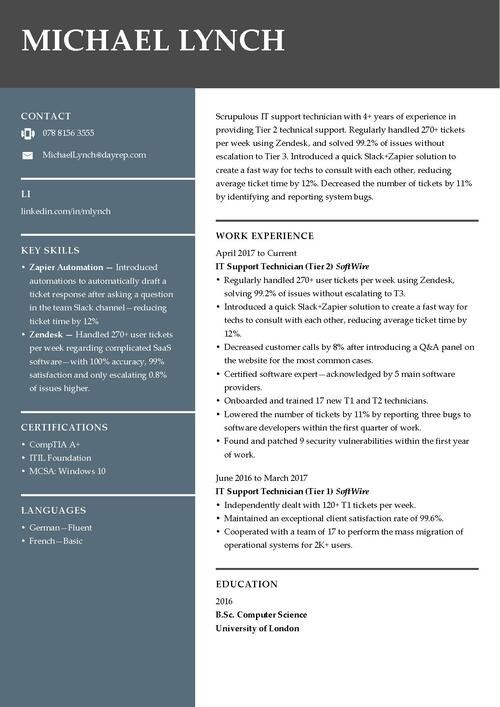 YES
YESOur customers were hired by:
Ever wondered what sets top professionals apart in a competitive job market? It’s not just their experience—it’s the professional skills they bring to the table. Hard skills are the backbone of career success, from mastering technical tools to excelling in specialised tasks.
In this guide, you will find comprehensive examples of hard skills in the workplace and expert guidance on how to weave them into your CV for maximum effect. Let's get started.
Create an effective CV in minutes. Choose a professional CV template and fill in every section of your CV in a flash using ready-made content and expert tips.
Create a professional CV now!
 NO
NO YES
YESWe created the sample on the right using our builder. See other good CV examples like this one.
Listing skills on a CV? Check these guides:
Hard skills are technical abilities required for performing specific tasks or professional roles. They are tangible and measurable, often acquired through formal education, training, or hands-on experience. Unlike soft skills, which focus on interpersonal and behavioural aspects, hard skills are concrete and can be validated by certifications, degrees, or demonstrated results.
Examples of hard skills include:
Hard skills play a critical role in showcasing your technical competency for a job. Employers seek hard skills on CVs, job applications, and interviews, and may expect that you can validate your qualifications with certifications, tests, or portfolio samples.
Let’s clarify the difference between these two types of skills.
Hard skills are job-specific technical abilities, like proficiency in software tools or knowledge of legal regulations. They are typically learned through studies and coursework, training, or practical experience.
In contrast, soft skills are interpersonal and adaptive qualities, such as fluent communication, problem-solving, and effective teamwork. These are often shaped by personality and experience, making them harder to quantify.
For instance, a financial analyst’s hard skills might include expertise in financial modelling and data visualisation tools, while their soft skills might encompass effective communication to present findings to stakeholders and collaboration with cross-functional teams.
Employers value both hard and soft skills, as technical expertise must be complemented by collaboration and adaptability to succeed in diverse work environments. Balancing these skills is key to excelling in most roles.
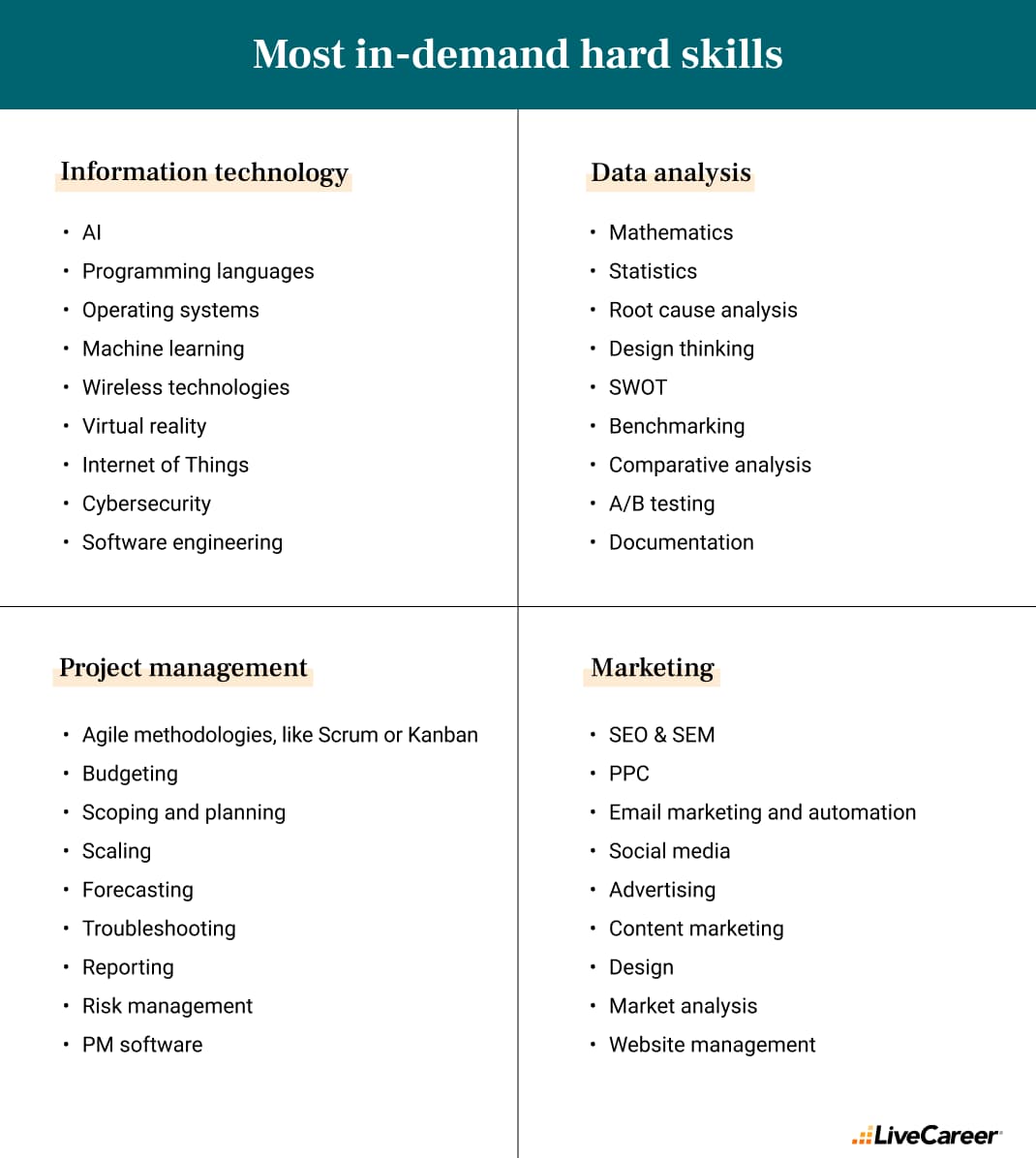
The UK has a critical hard skills gap. Good for you, because we’re going to help you present yours prominently. Are you in the digital sector? Even better! 72% of large companies are suffering hard skills gaps. Closing the gap gives you a critical advantage.
Let’s have a look at the key hard skills examples:
Pretty much every company in the world has to use some kind of communication and productivity software to manage their work in the information era. Familiarity with a range of them ensures your smooth transition.
In most companies, career progression naturally involves taking on more responsibilities and leading larger teams. To excel in this journey, you’ll need to develop a strong set of hard management skills:
No brand can exist today without a solid content plan. If this is your area of expertise, make sure to list the hard skills relevant to your new job. You can use a skills-based CV if your work is mostly freelance.
One of the most in-demand job skills in today's digitalised world is expertise in social media. Once you have the content, it needs to go somewhere. Mastery of social media and content delivery platforms is invaluable in building brand presence. Don’t just write ‘Instagram’ under your skills heading—explain your successful activities and their outcomes.
There is more to the Internet than just social media. Effective use of tools that can reach an unlimited number of customers is worth its weight in gold. Prioritise those that your new employer uses. Hard skills examples for marketing professionals include:
While sales skills might initially appear to be purely soft, effective sales professionals possess a range of technical and transferable skills that are systematic and repeatable—making them prime examples of hard skills.
Of course, languages are perfect examples of hard skills. In today’s interconnected world, they are still highly sought after and definitely should make the list of top 10 hard skills. They command their own section at the bottom of a CV—more about that later.
As broad as IT might be, most of the time, all of these technical skills are in demand. According to LinkedIn, 4 out of the top 5 most in-demand hard skills are IT skills.
Coding is practically a world of only hard skills. Here are the most popular programming languages that could adorn your CV based on your employer’s requirements.
JavaScript, Python and HTML are currently the most in-demand programming skills. And according to CompTIA, these are the five most in-demand hard tech skills:
For more guidance, read our guides on IT skills and computer skills.
In today’s world, data is everywhere—every decision, every action, every interaction generates valuable information. But raw data is meaningless without someone to interpret it. If you have the ability to analyse and make sense of complex data, your expertise will be in high demand and highly rewarded. Analytical hard skills examples include:
Software:
The structure of your CV may vary depending on your experience, industry, and specific needs (check out our industry-specific guides for tailored advice). However, the fundamental answer to the question, “How do I write a CV?” remains straightforward and universal: focus on effectively demonstrating your hard skills to make an impact.
Every perfect CV begins with a strong CV personal statement, also known as a CV summary. While it might feel daunting to condense your value into just six lines, this section is your chance to shine. Use it to immediately showcase your most impressive hard skills and achievements. Remember, many recruiters won’t read beyond this section if it doesn’t grab their attention—make every word count!
Scrupulous IT support technician with 7+ years of experience in providing Tier 2 technical support. Regularly handled 270+ tickets per week using Zendesk, and solved 99.2% of issues without escalation to Tier 3. Introduced a quick Slack+Zapier solution to create a fast way for techs to consult with each other, reducing average ticket time by 12%. Decreased the number of tickets by 11% by identifying and reporting system bugs.
A strong CV summary will convince the recruiter you’re the perfect candidate. Save time and choose a ready-made personal statement written by career experts and adjust it to your needs in the LiveCareer CV builder.
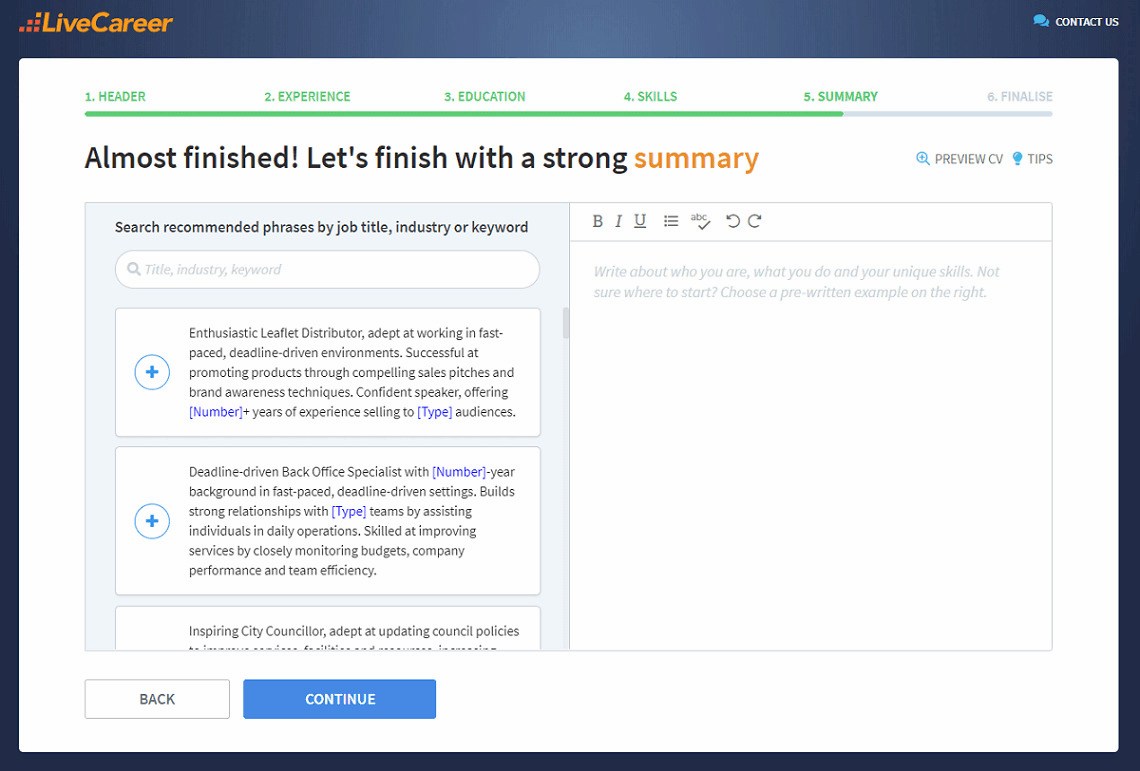
Your work experience section shouldn’t be a bland list of routine tasks—that’s what your competition is doing. Instead, think of it as your professional highlight reel, showcasing your most impressive achievements and career-defining moments.
Here are some CV tips to make your work experience stand out:
IT Support Technician (Tier 2)
SoftWire, Birmingham
April 2017–Present
With a student CV (or a CV with no experience), you have to get more out of this section. List all relevant courses, any extracurricular activities, and tools you became familiar with during your education. That can help compensate for your lack of experience.
If you already have substantial work experience, simply list your degree on your CV and move on—that’s all you need for the education section.
However, in a student CV (or a CV with no experience), this section needs to work harder for you. Include relevant courses, extracurricular activities, and any tools or software you became proficient in during your studies. These details can help bridge the gap and showcase your potential to employers.
B.Sc. in Computer Science
University of London
September 2014–June 2016
Reserving a small side section for skills on your CV might not be the best approach—especially since it’s so common. Here’s how you can stand out:
Key Skills
Before you mention your love of yoga in the CV hobbies and interests section—list languages, certificates, and awards clearly under their own headings. They are all extremely useful hard skills to mention.
Extra sections
Certifications
Workshops
Languages
Hard skills are your lucky break—you can dive into tutorials, take courses, or practice independently and come away with valuable knowledge. For free resources, check out the National Careers Service's Skills Toolkit to boost your expertise.
When you’re applying for jobs, don’t forget to write a compelling cover letter. It’s your chance to explain how your impressive array of hard skills makes you an indispensable asset to any team. Good luck with your interviews!
You don’t have to be a CV writing expert. In the LiveCareer CV builder you’ll find ready-made content for every industry and position, which you can then add with a single click.

Our editorial team has reviewed this article for compliance with Livecareer’s editorial guidelines. It’s to ensure that our expert advice and recommendations are consistent across all our career guides and align with current CV and cover letter writing standards and trends. We’re trusted by over 10 million job seekers, supporting them on their way to finding their dream job. Each article is preceded by research and scrutiny to ensure our content responds to current market trends and demand.
About the author
Since 2013, the LiveCareer UK team has shared the best advice to help you advance your career. Experts from our UK editorial team have written more than one hundred guides on how to write the perfect CV or cover letter.
Rate this article:
Hard skills
Average:
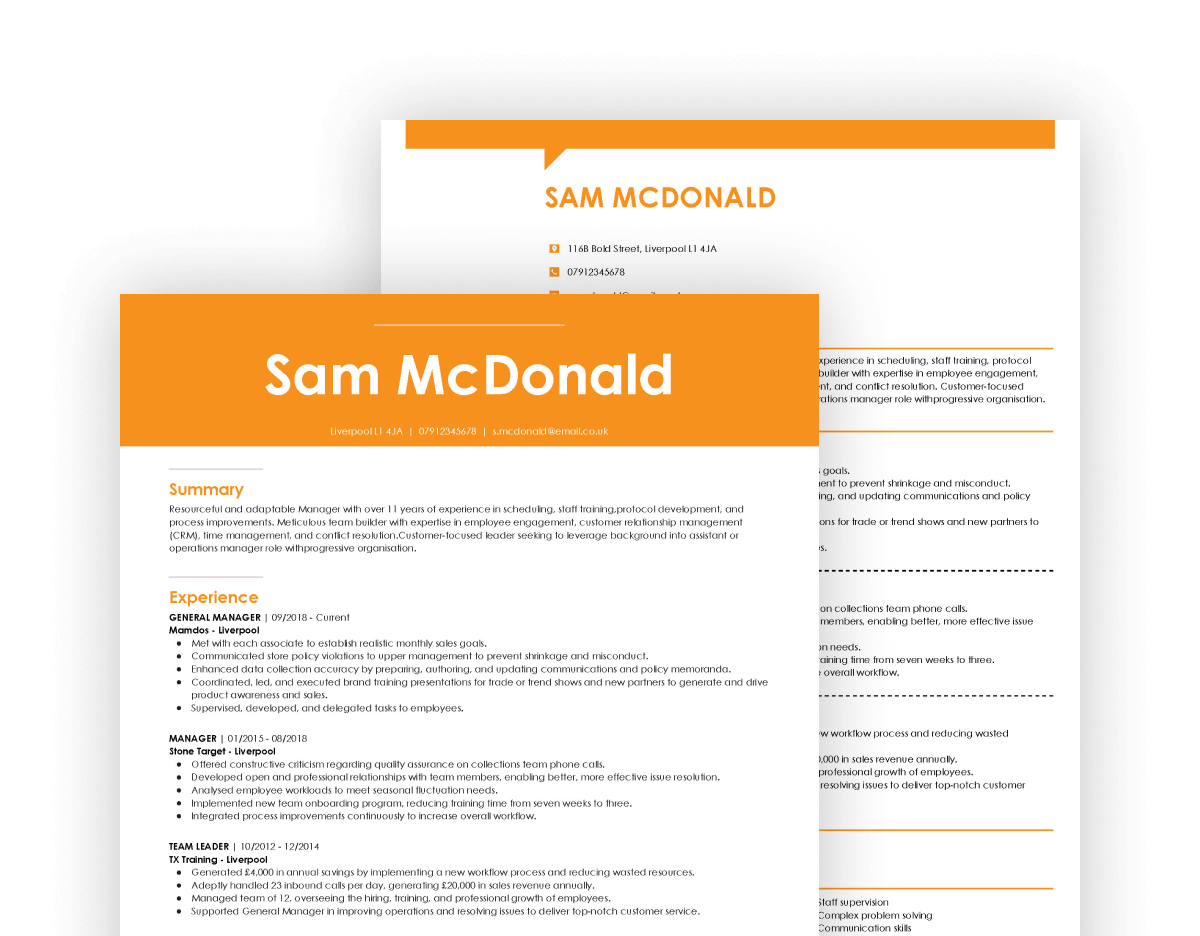
Too busy in the lab or poring over databases to learn how to write the best possible research assistant cover letter? We’ve done the research for you, check it out.
Our customers were hired by: